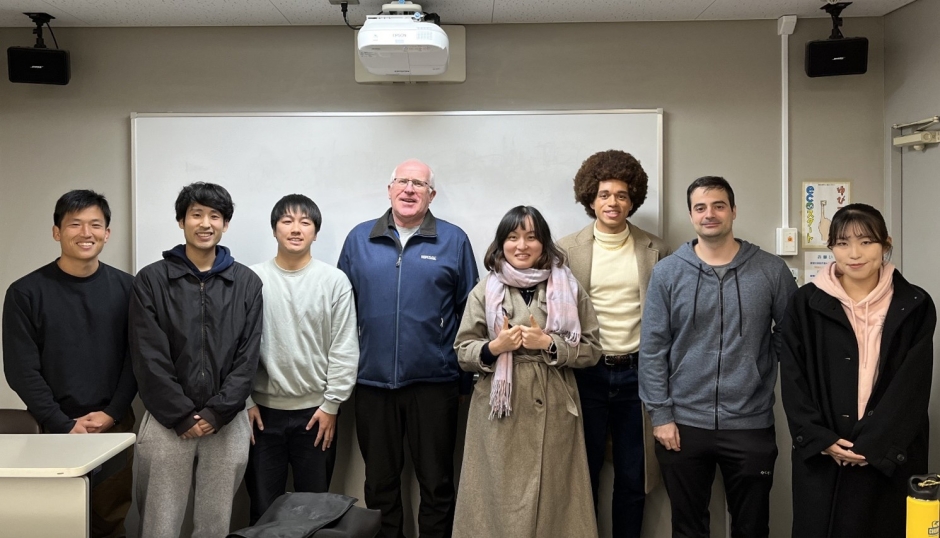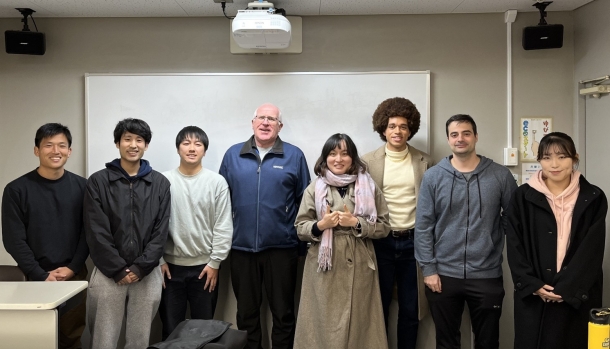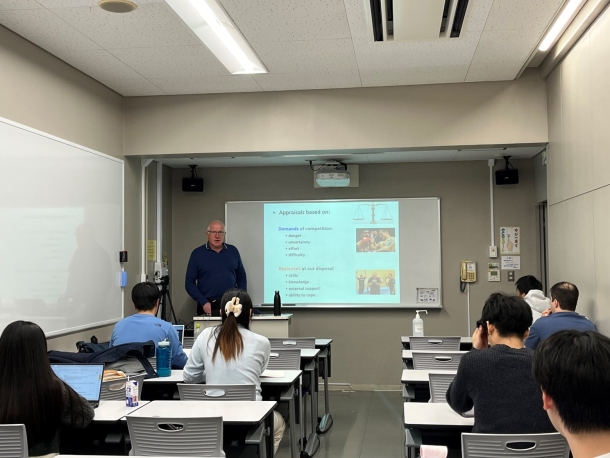- News
- From November 1 to December 1, 2024, Faculty of Sport Sciences, Waseda University invited Professor Christopher Ring of the University of Birmingham to give 14 face-to-face intensive lectures in the fall semester.
From November 1 to December 1, 2024, Faculty of Sport Sciences, Waseda University invited Professor Christopher Ring of the University of Birmingham to give 14 face-to-face intensive lectures in the fall semester.

- Posted
- Fri, 13 Dec 2024
Professor Christopher Ring is in charge of sports psychology at the School of Sport, Exercise and Rehabilitation Sciences at the University of Birmingham. He has published numerous research papers on topics such as the acquisition of motor skills and preventing stage fright under pressure, applying psychophysiological research methods.
He first visited our university as a guest speaker at the SGU 10th Anniversary Symposium “Play Sports, Stay Healthy, and Enjoy Aging Society – Our Global Collaborations, Achievements And Beyond” held on October 8th, 2023. This time, he revisited the Faculty of Sport Sciences and gave a special lecture on “Psychophysiology of Sport, Exercise and Performance”. During his stay, he also actively provided research advice to graduate students through joint research with Professor Hiroaki Masaki of our Graduate School.
The following topics were covered in the intensive lecture.
Sport Performance: Classic Theories & Processing Efficiency Theory
Reinvestment Theory & Implicit Motor Learning
Sport Evoked & Induced EEG Responses, Sport Neurofeedback
Preparation for Action, Attentional Focus, etc.


The following is a report from a student who participated in this intensive lecture.
Class Report of Psychophysiology of Sport, Exercise and Performance |
| Yunfan Wu, Ph.D. 3rd year student |
| This semester, I attended an intensive class taught by a visiting scholar. Professor Christopher Ring is a leading scholar in sport psychology. His class is held twice a week. In each class, he introduced a main topic, collected many studies to explain the concept, and shared the important findings with us. We can quickly grasp the basic picture of how to design the experiment using physiological indicators and what results they found. We will have a general idea about designing different experiments by measuring physiological indicators in sport psychology. The first class explores the link between anxiety, arousal, and sports performance, discussing models like social facilitation, the inverted-U hypothesis, and catastrophe theory. Physiological indicators such as EEG and heart rate variability highlight how stress affects performance under pressure. The second class explores reinvestment theory, noting that pressure leads to overthinking, impacting performance, especially in novices. Athletes with high reinvestment tendencies perform worse under pressure, as seen in golf studies. Learning strategies can adjust these tendencies and improve performance. Psychophysiological processes during motor preparation indicate performance outcomes, with internal focus benefiting novices and external focus aiding experts. EEG studies reveal distinct brain activity patterns in experienced athletes during motor tasks. Social contexts also influence psychological experiences; team competitions enhance performance through social support. The biopsychosocial model shows that challenge appraisals can boost performance while threat appraisals hinder it. Quiet Eye (QE) refers to the crucial final gaze before action, with longer fixation periods linked to better performance in sports. The type of attentional focus affects motor learning, with an external focus generally yielding superior outcomes. EEG greatly aids in studying brain activity related to motor control, and NFT provides real-time feedback to help athletes optimize their brain function. Exercise enhances cognitive abilities and reduces pain perception, with moderate aerobic exercise being the most effective. Models like the Central Governor Model explain exercise regulation and Brain Endurance Training combines mental and physical tasks to improve overall performance. In Conclusion, these courses highlight the interaction of physiological and psychological factors influencing athletes’ performance and cognitive function. The research underscores the complexity of optimizing athletic and cognitive outcomes by integrating findings on anxiety, reinvestment, motor preparation, competition, challenge and threat states, attentional focus, neurofeedback, and exercise’s broader impacts. Happy to attend this class, and I hope we can invite more visiting scholars and have more classes in the future. |
